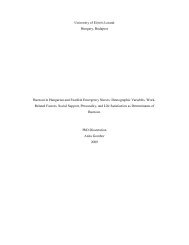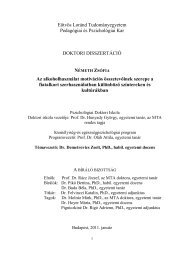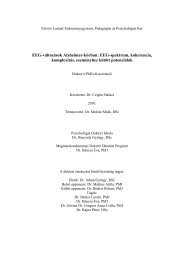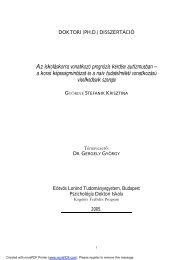értekezés tézisei - Pszichológiai Doktori Iskola - Eötvös Loránd ...
értekezés tézisei - Pszichológiai Doktori Iskola - Eötvös Loránd ...
értekezés tézisei - Pszichológiai Doktori Iskola - Eötvös Loránd ...
Create successful ePaper yourself
Turn your PDF publications into a flip-book with our unique Google optimized e-Paper software.
Roy, D. L; Viswesvaran, C; Pluta, P. (2005). An evaluation of construct validity: what is this<br />
thing called emotional intelligence? Human Performance, 18(4), 445-462.<br />
Rózsa, S; Kő, N; Oláh, A. (2006). Rekonstruálható-e a Big Five magyar mintán: A Carparaféle<br />
„Big Five Kérdőív” (BFQ) felnőtt változatának hazai adaptációja és nemzetközi<br />
összehasonlító elemzése. Magyar <strong>Pszichológiai</strong> Szemle, 26(1), 57-76.<br />
Russel, K; Carter, P. (1997). Fejleszd az IQ-dat! Akadémiai Kiadó, Budapest. [ A fordítást és<br />
a tesztek magyar változatát Nábrády Mária és Oláh Attila végezték el.]<br />
Saklofske, D. H; Austin, E. J; & Minski, P. (2003). Factor structure and validity of a trait<br />
emotional intelligence measure. Personality and Individual Differences, 34, 707-721.<br />
Salovey, P; Bedell, B. T; Detweiler, J. B; Mayer, J. D. (2000). Current directions in emotional<br />
intelligence research, In M. Lewis; J. M. Haviland-Jones (Eds.), Handbook of<br />
Emotions (pp. 504-520), New York: Guilford Press.<br />
Salovey, P; Mayer, J. D. (1990). Emotional intelligence. Imagination Cognition, and<br />
Personality, 9, 185-211.<br />
Schachter, S. (1971). Emotion, obesity, and crime. New York: Academic Press.<br />
Schutte, N. S; Malouff, J. M; Bobnik, C; Coston, T. D; Greeson, C; Jedlicka, C; Rhodes, E; &<br />
Wendorf, G. (2001). Emotional intelligence and interpersonal relations. Journal of<br />
Social Psychology, 141, 523-536.<br />
Schutte, N. S; Malouff, J. M; Hall, L. E; Haggerty, D. J; Cooper, J. T; Golden, C. J;<br />
Dornheim, L. (1998). Development and validation of a measure of emotional<br />
intelligence. Personality and Individual Differences, 25(2), 167-177.<br />
Spaulding, W. D. (Ed.) (1994). Integrative view of motivation, cognition and emotion. Vol. 41<br />
of the Nebraska Symposium on motivation. Lincoln and London: University of<br />
Nebraska Press.<br />
Storbeck, J; & Clore, G. L. (2005). With sadness comes accuracy; with happiness, false<br />
memory: Mood and the false memory effect. Psychological Science, 16, 785-791.<br />
Sullivan, A. K. (1999). The emotional intelligence scale for children. Dissertation Abstracts<br />
International, 60, 68.<br />
Tabachnick, B. G; Fidell, L. S. (1996). Using multivariate statistics, 2nd ed. New York:<br />
Harper & Row.<br />
Van Rooy, D. L; Viswesvaran, C. (2004). Emotional intelligence: a metaanalytic investigation<br />
of predictive validity and nomological net. Journal of Vocational Behavior, 65, 71-95.<br />
Zeidner, M; Matthews, G; Roberts, R. D. (2001). Slow down, you move too fast: Emotional<br />
intelligence remains an ’elusive’ intelligence. Emotion, 1(3), 265-275.<br />
Zeidner, M; Roberts, R. D; Matthews, G. (2008). The Science of emotional intelligence:<br />
Current consensus and controversies. European Psychologist, 13(1), 64-78.<br />
További, a fentiekben nem hivatkozott, a disszertáció témájához kapcsolódó<br />
tudományos közlemények listája<br />
Nagy Henriett; Czeglédi Edit (2010). A Schutte-féle Önbeszámolós Érzelmi Intelligencia<br />
Skála (SSREI-HU) faktorstruktúrájának elemzése. Magyar <strong>Pszichológiai</strong> Társaság<br />
26







